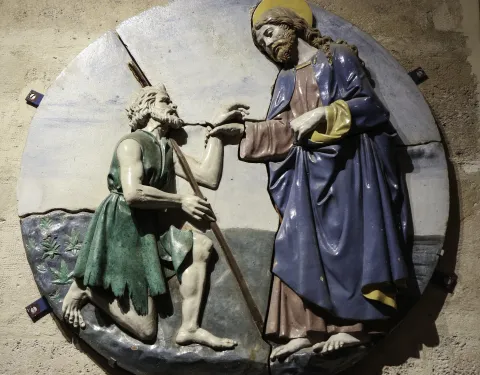
This reflection contrasts truth used as political instrument with truth that liberates the soul. Politicians often curate facts to persuade and gain power; by contrast, the Gospel’s “truth will set you free” describes truths that reshape identity. Using the healed leper as an example, the talk shows how genuine gratitude—especially directed to God—reveals our dependence, exposes entitlement, and transforms how we see ourselves and others. Cultivating gratitude turns gifts into formative experiences, teaching us to speak and live truthfully rather than treat people as means to power. [28th Sunday in Ordinary Time, Cycle C]
I once gave a talk on politics and truth-telling. It was very well attended, and I think because so many of us are worried about the ways in which our politicians distort the truth. We sometimes think of politicians as especially prone to lying, and certainly some of them are, but it strikes me that there is a deeper problem with the way politicians relate to truth, and it relates to something that all of us struggle with in our own ways.
Politicians sometimes lie, but even when they are telling the truth, all too often they are using the truth for their own ends. They aren’t usually interested in simply telling the truth for its own sake. They want to tell us a carefully-curated story which is at best a small part of the truth to persuade us to support them. They want to use the stories they tell us to gain power, and so even when they are telling the truth, it isn’t out of a respect for truth.
When Jesus says that the truth will set you free (John 8:32You will know the truth, and the truth will make you free."), he’s not thinking of truth like that at all. It’s not that the truth is being used for some ulterior motive. It’s that when we know the truth, it transforms us. The deepest truths change who we are at our core.
I think something like that happens with genuine gratitude. The leper in today’s Gospel who returns and gives thanks sees himself in a brand new way. When we are genuinely thankful, even to other people but even more when we are thankful to God, we see ourselves in a brand new way.
For one thing, we cannot see ourselves as isolated individuals, standing on our own two feet. When we recognise, in gratitude, our dependence on others, and even more, when we give thanks to God for all he does for us, we realise that we couldn’t stand at all but for the love we receive.
Recognising that truth is never about some ulterior motive. Gratitude, real gratitude, is never about thinking that other people or God owe us the things we receive from them. The leper knows his healing is not something God had any obligation to provide. It’s the best kind of gift, free and with no strings attached. That’s why it prompts his gratitude.
The others were presumably also overjoyed at being healed, but they missed a deep truth about their healing. Actually, they did not come to see a deep truth about themselves. I presume they just went about their new lives, celebrated with their friends and family, maybe even told others the amazing story of their healing, but they didn’t come to see that their whole lives, sick or healthy, happy or sad, were gifts. They missed that they owed everything they were to God, that the right response was praise.
I live in Jamaica, and Jamaicans, when you ask them how they are, will often respond, “I’m blessed.” I think this is a fantastic reply, because it is always true. English people like me usually say, “I’m fine,” which, apart from the fact that it might well not be true, also misses this deep truth: whether I am fine or not, my life is a gift. I am blessed.
It also strikes me that there is nothing surprising about the fact that the one who is truly grateful is an outsider. It’s too easy, when you’re one of the privileged, one of the insiders, one of the people your society or your church favour, to think that what you get is somehow owed to you. Outsiders, who come to learn by bitter experience that people aren’t interested in what they need, may find themselves especially grateful, while the rest of us too easily take things for granted.
Learning to speak the truth, then, is about much more than being honest. It’s about seeing myself, and all around me, in a new way which liberates. Real gratitude teaches us a truth about ourselves which is hard to see any other way.
- Log in to post comments

